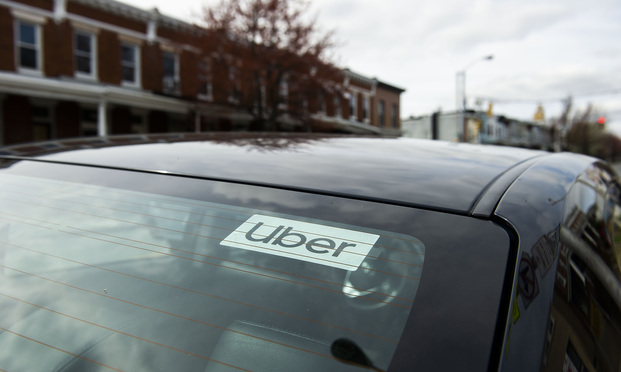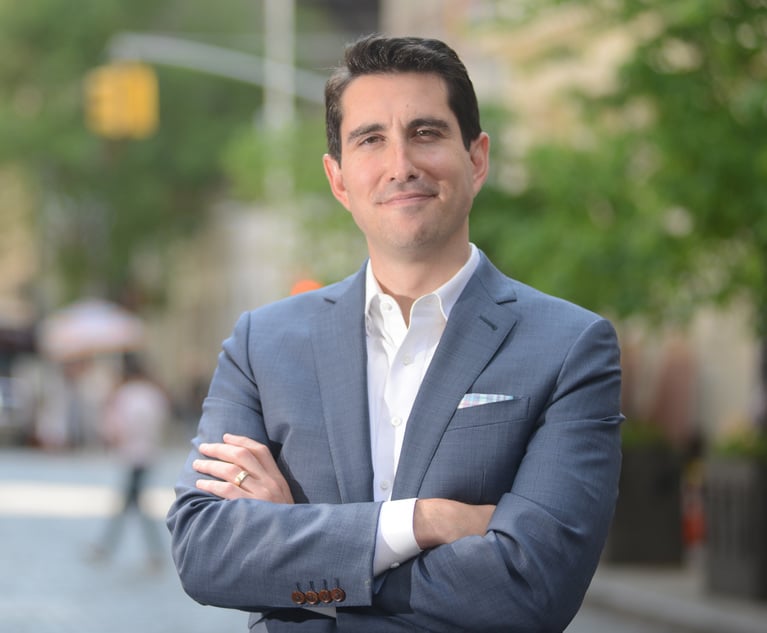Judge Asks Uber and Plaintiffs Lawyers to Find Less Restrictive Paid Sick Leave Policy During Pandemic
U.S. District Judge Edward Chen of the Northern District of California ordered lawyers at Gibson, Dunn & Crutcher and Lichten & Liss-Riordan to discuss a temporary policy that would allow Uber drivers to take paid sick leave without a doctor's note.
April 01, 2020 at 05:46 PM
6 minute read
 Uber car in the Hampden neighborhood of Baltimore, MD, on March 24, 2020.
Uber car in the Hampden neighborhood of Baltimore, MD, on March 24, 2020.
A federal judge ordered Uber Technologies Inc. to come together with lawyers representing drivers in a proposed worker misclassification class action to provide additional paid sick leave relief similar to that granted to employees under California law in light of the coronavirus pandemic.
U.S. District Judge Edward Chen of the Northern District of California told Uber's Gibson, Dunn & Crutcher attorneys and lawyers from Boston plaintiffs firm Lichten & Liss-Riordan to find a solution that allows workers to qualify for paid time off without having to get a doctor's note, as the ride-hailing company's current policy requires, to support those who do not have access to overburdened and sometimes costly health care providers.
Chen toward the end of a hearing Wednesday over plaintiffs' emergency motion for a preliminary injunction that would classify drivers as employees told the attorneys to call Chief Magistrate Judge Joseph Spero to negotiate a temporary policy. Lichten & Liss-Riordan's Shannon Liss-Riordan argued that the independent contractors should be considered employees under state law, allowing them to qualify for three days of paid sick leave under Section 246 of California's labor code.
"Just as a way to resolve the current request during the public health crisis, because I'm sure Uber does not want symptomatic drivers out there—I hope so—why not take additional steps to address this public health crisis, at least for some period of time to be able to access the limited benefits but that might be meaningful to folks?" the judge said during Wednesday's telephonic hearing.
Chen asked the attorneys to report back about whether there had been a discussion and the likelihood of a resolution by Friday.
As for the emergency motion for preliminary injunction, the judge did not seem convinced. Chen appeared to agree with Gibson Dunn's Theane Evangelis, who said granting a mandatory injunction ahead of class certification would be "truly extraordinary, and we don't have the record to justify it."
Chen said he was troubled with granting a mandatory injunction at this stage without proper precedent and that classifying Uber drivers as employees under California law could mean they lose access to federal protections under the Family First Coronavirus Response Act or the more recent CARES Act afforded to business owners and independent contractors.
"There's no question we're in a crisis and everyone involved should do everything we can do to facilitate the slowdown of the spread of this pandemic," he said. "The question here is more complicated … there is at least some risk of loss of federal benefits if the court would find drivers were employees."
Liss-Riordan responded by saying that enforcing state law would, at the very least, give drivers up to three days that they can be paid and stay home, which is critical in slowing the spread of the "deadly virus."
"Uber shouldn't be allowed to use procedural questions to avoid law in face of this crisis," she said.
Earlier this month, Uber rolled out a financial assistance policy for drivers during the coronavirus. Drivers can take advantage of up to 14 days of financial assistance if they are diagnosed with COVID-19; placed in quarantine or asked to self-isolate by a public health authority or licensed medical provider; or if their account is restricted by Uber after a public health authority has indicated a driver has been exposed to someone diagnosed with COVID-19.
Evangelis said that Uber has already paid 1,400 claims nationally, averaging $900. "Uber has been working hard to process these claims and provide relief to drivers," she said.
Although more generous in terms of time, Uber's policy is more restrictive than California law, which does not require a doctor's note or guidance from a public health authority to take advantage of paid sick leave, Liss-Riordan said. Plus she asserted that the California law could be stacked on federal protections.
Chen said if a central dispute over the motion is Uber's documenting requirements, he would ask Uber to consider amending the process to allow self-certification of COVID-19. "Wouldn't that be a practical solution?" he asked.
Evangelis said that if someone is in fact an employee who must report to work and is concerned about doing so because they are sick, that is a very different situation. "Three days alone if someone is sick is not going to help," she said. Given the contagion cycle of the virus, returning to work after three days might actually do more harm than good, she said.
She also pointed out that the named plaintiffs in the case are not sick and instead are making a case for financial benefits, and the financial benefit is still greater under Uber's assistance and federal policies.
"This sort of relief is only to prevent extreme and serious damage," she said. "The fact that this is only about monetary relief alone takes it out of that test. So, we really shouldn't be discussing which monetary benefit is more or less, but the monetary benefit would be more under federal law."
Liss-Riordan welcomed the opportunity to sit down with Uber to come up with a solution, but urged the court that even under less pressing circumstances, a preliminary injunction classifying Uber drivers as workers is in order. "It's not true that they would be harmed, and it shouldn't be used as a smokescreen," she said.
Lichten & Liss-Riordan filed a similar motion on behalf of Lyft drivers in another worker misclassification case. U.S. District Judge Vince Chhabria of the Northern District of California will hear arguments on that motion via Zoom video conference Thursday.
NOT FOR REPRINT
© 2025 ALM Global, LLC, All Rights Reserved. Request academic re-use from www.copyright.com. All other uses, submit a request to [email protected]. For more information visit Asset & Logo Licensing.
You Might Like
View All
Patreon Hit With Lawsuit for Allegedly Diverting Subscriber Data to Meta

Kraken’s Chief Legal Officer Exits, Eyes Role in Trump Administration
3 minute read
‘Facebook’s Descent Into Toxic Masculinity’ Prompts Stanford Professor to Drop Meta as Client
6 minute read
Miami Judge Approves Shaq's $11 Million Settlement to Resolve Astrals Investor Claims
3 minute readLaw Firms Mentioned
Trending Stories
- 1'A Death Sentence for TikTok'?: Litigators and Experts Weigh Impact of Potential Ban on Creators and Data Privacy
- 2Bribery Case Against Former Lt. Gov. Brian Benjamin Is Dropped
- 3‘Extremely Disturbing’: AI Firms Face Class Action by ‘Taskers’ Exposed to Traumatic Content
- 4State Appeals Court Revives BraunHagey Lawsuit Alleging $4.2M Unlawful Wire to China
- 5Invoking Trump, AG Bonta Reminds Lawyers of Duties to Noncitizens in Plea Dealing
Who Got The Work
J. Brugh Lower of Gibbons has entered an appearance for industrial equipment supplier Devco Corporation in a pending trademark infringement lawsuit. The suit, accusing the defendant of selling knock-off Graco products, was filed Dec. 18 in New Jersey District Court by Rivkin Radler on behalf of Graco Inc. and Graco Minnesota. The case, assigned to U.S. District Judge Zahid N. Quraishi, is 3:24-cv-11294, Graco Inc. et al v. Devco Corporation.
Who Got The Work
Rebecca Maller-Stein and Kent A. Yalowitz of Arnold & Porter Kaye Scholer have entered their appearances for Hanaco Venture Capital and its executives, Lior Prosor and David Frankel, in a pending securities lawsuit. The action, filed on Dec. 24 in New York Southern District Court by Zell, Aron & Co. on behalf of Goldeneye Advisors, accuses the defendants of negligently and fraudulently managing the plaintiff's $1 million investment. The case, assigned to U.S. District Judge Vernon S. Broderick, is 1:24-cv-09918, Goldeneye Advisors, LLC v. Hanaco Venture Capital, Ltd. et al.
Who Got The Work
Attorneys from A&O Shearman has stepped in as defense counsel for Toronto-Dominion Bank and other defendants in a pending securities class action. The suit, filed Dec. 11 in New York Southern District Court by Bleichmar Fonti & Auld, accuses the defendants of concealing the bank's 'pervasive' deficiencies in regards to its compliance with the Bank Secrecy Act and the quality of its anti-money laundering controls. The case, assigned to U.S. District Judge Arun Subramanian, is 1:24-cv-09445, Gonzalez v. The Toronto-Dominion Bank et al.
Who Got The Work
Crown Castle International, a Pennsylvania company providing shared communications infrastructure, has turned to Luke D. Wolf of Gordon Rees Scully Mansukhani to fend off a pending breach-of-contract lawsuit. The court action, filed Nov. 25 in Michigan Eastern District Court by Hooper Hathaway PC on behalf of The Town Residences LLC, accuses Crown Castle of failing to transfer approximately $30,000 in utility payments from T-Mobile in breach of a roof-top lease and assignment agreement. The case, assigned to U.S. District Judge Susan K. Declercq, is 2:24-cv-13131, The Town Residences LLC v. T-Mobile US, Inc. et al.
Who Got The Work
Wilfred P. Coronato and Daniel M. Schwartz of McCarter & English have stepped in as defense counsel to Electrolux Home Products Inc. in a pending product liability lawsuit. The court action, filed Nov. 26 in New York Eastern District Court by Poulos Lopiccolo PC and Nagel Rice LLP on behalf of David Stern, alleges that the defendant's refrigerators’ drawers and shelving repeatedly break and fall apart within months after purchase. The case, assigned to U.S. District Judge Joan M. Azrack, is 2:24-cv-08204, Stern v. Electrolux Home Products, Inc.
Featured Firms
Law Offices of Gary Martin Hays & Associates, P.C.
(470) 294-1674
Law Offices of Mark E. Salomone
(857) 444-6468
Smith & Hassler
(713) 739-1250






